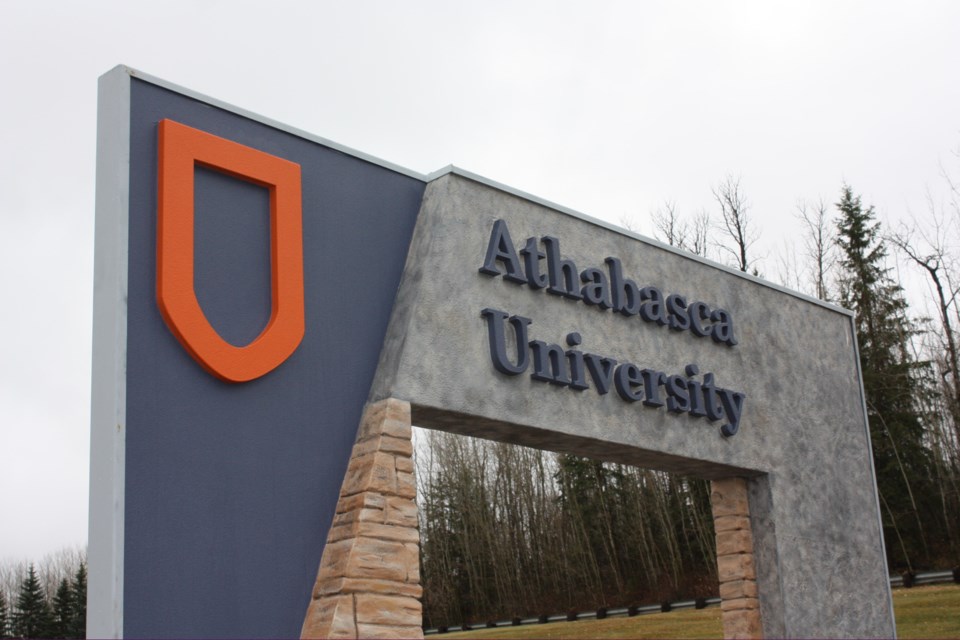ATHABASCA — Following a firm request from Athabasca County council for Athabasca University (AU) executive to meet with members of the Keep Athabasca in Athabasca University (KAAU) campaign, a date was set.
Several representatives from both sides attended the June 15 virtual meeting, said KAAU committee member Mavis Jacobs, but the message remained the same — that AU is moving forward with its near-virtual plan.
“The end result was the university is planning to move ahead with their near-virtual strategy and assessing all staff the same whether Athabasca-based or elsewhere, and they couldn't give us any estimate because they said they haven't finished their planning of numbers that would be placed-based in Athabasca in December, or even three- to five-years out, and there will be a transition period,” Jacobs said June 17.
Jacobs said the meeting was pleasant even if the ad-hoc group didn’t feel many questions were answered.
“It was cordial and I said we do want to continue to connect by phone or e-mail or even in meetings,” she said. “But I said that we haven't heard anything that has given us a commitment to continuing with more place-based employment in Athabasca or recruiting in Athabasca, or anything about the president and as a result we're going to continue our campaign.”
AU's vice president community relations Kristine Williamson said AU was happy with how the meeting went in a June 17 e-mail,
“AU was pleased to connect with the community campaign group earlier this week and we look forward to discovering ways that AU can support the community’s strategy and plan for local and regional growth and diversity,” she wrote.
She added progress is underway for the working group researching the near-virtual plan.
“AU’s near-virtual working group is leading this very important initiative and progress is well underway,” she said. “When AU has information to provide publicly on this work, we will certainly (provide it) at that time.”
Jacobs felt their message may have been heard by AU, but wasn’t sure.
“My take was they want this near-virtual strategy across the board and just maybe they will be a little bit more flexible on employees who want to be place-based in Athabasca; a case could maybe be made, probably individual cases,” said Jacobs. “And maybe just more of a hybrid – some days in and some days out or something – but there was no commitment to that.”
Committee member John Ollerenshaw also attended the meeting and said it was what the ad hoc group expected.
“I guess the meeting went alright.” he said June 17. “It's sort of what we expected — we agreed to disagree. Basically, we asked some questions (and) they didn't give any answers or they deflected the question, so I guess we didn't really get any further ahead, but I think we did establish a little bit of a relationship.”
Ollerenshaw said some of the questions they asked included where AU sees itself in three to five years regarding the use of the buildings and if the president, when chosen, will commit to living in Athabasca.
“It's very difficult to try to deal with them because they won't answer any questions,” he said. “These ideas about virtual or near virtual; that people from Athabasca can apply for jobs at AU (but) so can everybody in the world, anybody in Canada. We always could do that so it’s a very specious argument.”
Jacobs said they were told Athabascans have an advantage over other candidates because they can apply for and choose place-based employment without the trouble of moving, but Ollerenshaw pointed out that’s superficially plausible, but factually wrong.
“There’s 3,000 people in Athabasca and 33,000,000 in Canada so that’s a one in 10,000 (chance of being hired),” he said.
For now, the ad hoc committee will move forward with their campaign and hiring a lobbyist, he said.
“All I can say is we agree to disagree. We’re going to continue with our course and they’re going to continue with theirs apparently,” said Ollerenshaw.



